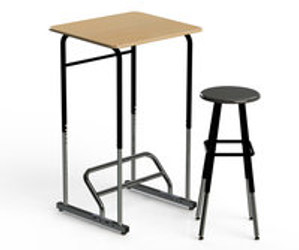Standing Desks Are Coming To Schools, To Cure Obesity And Increase Attention Spans
15th Feb 2015
Increasing numbers of adults are throwing away their office chairs in favor of standing desks, believing that staying on their feet during working hours will improve their health. Should we be encouraging kids to do the same?
Yes, according to a study from three schools in Texas. It shows that when kids are given the opportunity to stand during classroom time, they burn more calories and seem to have greater attention span.
The research, conducted by A&M associate professor Mark Benden, introduced "stand-biased" desks to 480 students in three elementary schools in the College Station Independent School District. Each kid wore a sensor on their arm to record "step count" and "calorie expenditure" across five consecutive school days.
The results showed the raised desks (which have stools nearby) significantly increased activity. The students burned 15% more calories than a control group that used traditional sitting desks.
"When children are given environments that encourage and promote movement during instructional time, they will move more and consequently increase their energyexpenditure," says the paper reporting the results. "Similarly, traditional seated environments may actually constrain children’s natural physicality and
restrict their movements to a minimal level."
Benden says the desks also improved concentration, according to follow-up interviews with the 25 teachers involved, and that younger students were more willing to stand than older kids—which is perhaps the opposite of what you might expect.
"We have now run classroom level experiments for 1st grade through 12th," he says via email. "Younger kids actually [stand more] and are generally more mobile, with less stool use than the older kids. [We think] part of this is because of years of 'sit-down, sit-still' edicts from educators that developed sedentary habits."
The work is at a relatively early stage. Benden needs to test the desks (which are made by a local company called Stand2Learn) with greater numbers of students and look at what effect certain instructions from teachers may have on the results. In this experiment, the kids were told very little about the desks; they were just in place when they turned up on the first day of a semester.
Still, the results could point to the value of moving away from standard seating. "The results of this study and previous pilot studies have established that activity-permissive classrooms do not cause harm to students; result in increased energy expenditure that may combat obesity among those in the highest risk categories; and improve behavioral engagement," the paper says.
"If this environmental change improves both health and academic outcomes, this should serve as an incentive for schools to invest in altering their standard for classroom furniture to stand-biased modifications."






